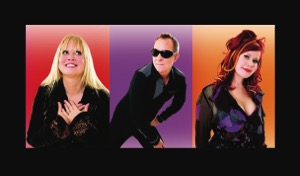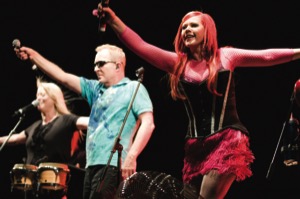
Can a benefit concert featuring a headlining act whose songs bridge the gaps separating four decades of musical styles bring together two generations of San Diegans devastated by HIV/AIDS and today’s millennial generation, which sees the virus as merely a chronic medical condition – or just another STD?
Jay Sheehan says “yes;” The B-52s can and will do just that Aug. 14 at Embarcadero Marina Park South. Sheehan, 53, is a man with a deeply personal connection to the mission he’s working to accomplish with fellow organizers and with the San Diego Human Dignity Foundation; that mission is to build the San Diego AIDS Memorial.
“I had a lot of people who died of AIDS before the medicine became fantastic,” he told San Diego LGBT Weekly during a recent phone interview. Sheehan is taking a lead role as part of a task force to find funding, a physical site and a design for the memorial.
He hopes that once built, San Diego’s AIDS Memorial will be poignant, yet bold. He also hopes its location, scale and design will engender a sense of empathy and a place of honor in the hearts and minds of all who see it.
Sheehan sees the project as a chance to memorialize two generations decimated by a disease that tore through the local LGBT community like a typhoon.
“I was much younger during the first round of deaths in the 1980s when HIV/AIDS was first discovered,” he said. “There were a lot of deaths; people didn’t know what was happening. Then AZT and some of the first treatments came out. You kind of stopped hearing about deaths for a little while. Then, in the early 1990s, it began again.”
Sheehan adds the qualifier that perhaps the “second-wave” dynamic he witnessed was unique to his circle of friends. However, his assertion that there was an initial wave of AIDS-related deaths in the early 1980s, followed by a second wave in the early ‘90s seems to be backed up by news reports of the time.
“I belonged to the gay softball league here in San Diego,” Sheehan told LGBT Weekly. “We were a tight-knit group. A lot of those guys started passing away in the early ‘90s.”
Likewise, Sheehan’s experience as a gay man losing friends to HIV/AIDS also follows an alternative timeline compared to films, books and television series’ themed around the AIDS pandemic, whose epicenters-in-time tend to take place circa 1980.
“It felt like there was no hope during that period before really effective medications came,” he told LGBT Weekly. “It was not a good time. I feel like we’re kind of the ‘Lost Generation’ of San Diegans affected by this.
The good news, according to Jay Sheehan, is that the coming San Diego AIDS Memorial will be a place of affirmation and remembrance for anyone and everyone who died as a result of HIV/AIDS. That includes those lost in the 1980s, 1990s, the 2000s and beyond.
“It’s important to remember that people still die from this disease, even today,” Sheehan said.
A longtime stage manager and self-described rock-and-roller, he believes the B-52s benefit concert will set the right tone for the capital campaign to build a San Diego AIDS Memorial. The B-52s’ singles like “Rock Lobster”, “Legal Tender” and “Roam” laid part of the musical foundations that were the soundtrack of the 1980s, as did “Private Idaho” and “Love Shack” did in the ‘90s; perhaps even more so for the LGBT community than society writ large.
But having been cultural icons during the era that can fairly be called the height of fear and depths of death that defined the HIV/AIDS pandemic is only one connection the world’s original new wave band shares with Sheehan.
“We have had a lot of friends die from AIDS,” says B-52s singer, percussionist, keyboardist and songwriter, Fred Schneider. “We were there right from the beginning.”
Schneider and bandmates, Cindy Wilson, Kate Pierson and Keith Strickland, will join two other bands from their new wave-royalty class, The Fixx and The English Beat, Aug. 14.
Together, the three legendary bands represent a trifecta of new wave, ska and progressive bona fides unsurpassed in the “new music” scene from whence they came. Their coming together for a benefit concert to help raise funds to make real the vision for a new San Diego AIDS Memorial is an occasion near and dear to his and his bandmates’ hearts, according to Schneider. But this is far from the first time the B-52s have taken on social or political causes.
“We’ve always brought groups along with us,” says Schneider, adding that the band even considered doing voter-registration drives at past concerts. “We’ve had political groups, environmental groups, animal-rights groups. We’re doing Channel Z again. It’s always fitting; you just have to update stuff.”
Both Schneider and Sheehan say members of the LGBT community are by no means the only people to be devastated by AIDS.
“My mentor who gave me my first big break, Douglas Pagliotti, was a production stage manager at the Old Globe and his lover, Will Roberson was a director who [directed the original] musical, Suds: The Rocking ‘60s Musical Soap Opera, are two people I will especially think about when the memorial is dedicated,” Sheehan said.

“I was making coffee for the cast of Suds,” Sheehan recalls. “Doug gave me my first break at the Old Globe, and then both of them died within a month of each other.”
The memorial’s location and design have yet to be decided. In fact, the organizing committee is looking for artists to submit design proposals. Information about how to do that can be found at the group’s Facebook page or at SDHDF.org
Celebrating with the B-52s, The English Beat and The Fixx
While solemnity will no doubt be a foundational aspect of the memorial design, celebration of life is also a frequent characteristic of modern memorials. Naturally, celebration, fun and of course, music is what the Aug. 14 concert at Embarcadero Marina Park South, which will help fund the memorial, is all about.
The B-52s’ hit single, “Love Shack” practically defined the celebratory atmosphere of the 1990s, even though the single was released in 1989 as part of the band’s Cosmic Thing album. The track was a declarative coming-out-of-the-dark or turning of the page forward after the loss to AIDS of bandmate Ricky Wilson a couple of years earlier. The song and the album also represented an evolution beyond the B-52s’ youthfully cantankerous “anti-pop,” post-punk sound. That sound once raged with ironically bright subversion against the rock and disco sounds of late 1970s and early ’80s.
Rounding out the triple-A, three-act ticket for Aug. 14 are The Fixx and The English Beat. The Fixx may be best known for three seminally alternative hits, “Red Skies”, “Saved by Zero” and “One Thing Leads to Another”.
Meanwhile, The English Beat’s “I Confess”, “Save it for Later”, “Mirror in the Bathroom” and a redo of the Smokey Robinson’s classic, “Tears of a Clown” were as synonymous with the resurgence of ska (a syncopated precursor to reggae) during the late 1970s and early ‘80s, as were the Vespas they rode and the trench coats they wore during the second round of the mod fashion and lifestyle movement that ska bands popularized during that same period.
For Fred Schneider of the B-52s, this benefit concert is personal.
“Ricky passed away at only 33 in 1986, which was a big shock,” Schneider told LGBT Weekly, speaking of his friend and deceased bandmate.
No fan of big drug companies, Schneider believes some people have been cured of AIDS.
“I believe that some people have been cured; it’s just that drug companies don’t want it out there,” he told LGBT Weekly, adding that HIV/AIDS is still dangerous and that young people need to know it.
“[The memorial] will help increase awareness and remind people to be safe,” Schneider said.
With beehive hairdos in the disco-meets-surf wear era of the late 1970s and early ‘80s, as well as other intentionally non-conforming fashion cues and musical statements as their hallmarks, the B-52s frequently encountered head-scratching in their early career.
“We ran into that all the time,” Fred Schneider said. “Even Rolling Stone once sent out someone to interview us who wrote, ‘well, I don’t know where they’ll be in five years.’ Nobody knew where that guy was five years after that, but we’re still here.”
Asked how the band manages to remain relevant and to sell so much music through four decades and beyond, while so many of their peers have faded away, Schneider is circumspect.
“We never said we’re going to write a hit or do this or that,” he said. “We just wrote what we thought were our best songs.”
Ironically, as Schneider is aware, a significant portion of artists who have been inducted into the Rock & Roll Hall of Fame in recent years have claimed the B-52s as influencers of their music. Yet the band has yet to find its way to that institution’s revered halls in Cleveland.
“They haven’t asked us,” Schneider says.
Tickets to the B-52s AIDS Memorial Benefit Concert are available at Ticketmaster, and range from $60 to $250 for VIP tickets with a stage-side table, wait-staff service, private restrooms, a private bar and more.
http://bit.ly/1Rxi4ZF











